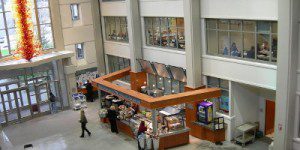Albers School of Business and Economics – Seattle University
History
The Albers School of Business and Economics is part of Seattle University, a private, Jesuit Catholic University founded in 1891. The school earned accreditation from the American Assembly of Collegiate Schools and Business (AACSB) in 1965, and the MBA program became AACSB accredited in 1980. The school is one of the 28 Jesuit universities in the United States.
Business education at Seattle University and the Albers School itself evolved to its namesake over the course of several decades. Business degrees were first awarded by Seattle University (then Seattle College) in 1937. The School of Commerce and Finance was established in 1945 and began granting MBAs in 1967. Another name change came in 1968, as the School of Commerce and Finance became the School of Business. In 1976, the school was renamed to honor the support of Eva and George Albers, and in 1990 “Economics” was made part of the name.
Location
Seattle University is in the city’s Capitol Hill neighborhood, which is also noted for being home to hospitals, churches, museums, and other schools. It’s within walking distance of downtown Seattle and landmarks like the Seattle Public Library’s Central Library. Seattle itself is home to the headquarters for such companies as Amazon, Nordstrom, and Starbucks.
The Albers main campus is located less than 15 miles away from the Seattle-Tacoma International Airport.
Faculty
Albers lists nearly 100 faculty members, with an average faculty-to-student ratio of 12:1. The school’s recent publications include The Journal of Leadership Education and The International Journal of E-Business Research.
Student Body
There are 631 students most recently enrolled in the various MBA programs at the Seattle University Albers School of Business and Economics.
MBA Degree Offerings
Albers offers three types of MBAs that serve students in different stages of their careers. The full-time Bridge MBA Program is for recent graduates who did not major in business and who have little to no work experience. The Professional MBA Program is full-time or part-time for students with at least two years of work experience. Finally, the Leadership Executive MBA is for students in mid to senior-level roles with at least seven years of experience. Classes for the LEMBA meet once a month.

